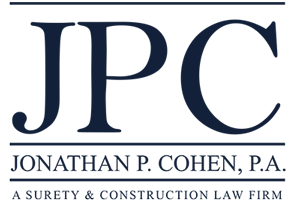Jonathan P. Cohen, P.A.
Call (954) 462-8850

The construction industry can involve a significant degree of risk. Companies and people who work within it will eventually be forced to deal with one of the parties involved filing for bankruptcy protection in the middle of a project. People who are involved in the construction industry need to understand Florida contractor bankruptcy law and how it can impact a project and their rights to recovery. When more entities become involved in a project or when the economics of the job change, the risk of bankruptcy increases. If you are dealing with a construction bankruptcy problem, whether you are seeking to get paid or need protection from creditorws, the law firm of Jonathan P. Cohen, P.A. can advise you about the legal options that might be available to you.
The type of bankruptcy will differ depending on the chapter of the Bankruptcy Code that is chosen by the debtor. A Chapter 7 bankruptcy petition is filed in cases in which the business will no longer be able to continue operating. This type of bankruptcy is known as a liquidation bankruptcy. When the business undergoes a Chapter 7 bankruptcy, its assets will be sold and the proceeds distributed to the creditors in order of priority.
Businesses can also file for protection under Chapter 11. A Chapter 11 Florida contractor bankruptcy is a reorganization of the business’s debts. Under this chapter, the business can continue to operate. The debtor will submit a plan to the bankruptcy trustee to reorganize its debts. The plan will need to be approved by the bankruptcy court and sometimes by a committee of creditors. The creditor’s committee includes representatives of the different categories of creditors. During the reorganization, the debtor will be allowed to assume or reject executory contracts. Executory contracts are contracts under which obligations are still owed to others. A construction contract may fall under this category.
When a bankruptcy petition is filed, the bankruptcy court will issue an automatic injunction to the creditors. This is an order that enjoins the creditors from taking collection actions against the debtor and the debtor’s property and assets. This automatic stay is meant to give the debtor time to figure out how its assets should be administered. While the stay protects the debtor, it can disrupt construction projects. By understanding how bankruptcy works, others involved in a project can take steps to mitigate the issues.
Determining which assets are included in the bankruptcy estate is a key part of the bankruptcy process. If an asset is determined to be the property of the bankruptcy estate, the asset will be controlled by the bankruptcy court. The bankruptcy estate may also control cash that the debtor has if it is determined to be the estate’s property. While some states have construction trust fund statutes that create trusts to hold construction proceeds to pay suppliers and subcontractors, Florida does not have a similar law. This means that the proceeds held by the debtor may be determined to be a part of the bankruptcy estate.
Suppliers or subcontractors who are owed money can argue that a constructive trust exists if they can demonstrate that they have substantial equitable interests in the proceeds that are held by the debtor. It might be wise for suppliers and subcontractors to include language in their contracts that direct the contractors to hold the funds in trust so that a bankruptcy court will not be able to control contractual proceeds. When the bankruptcy court decides whether to enforce a trust that is created in a contract, the agreement must include language that creates the trust when the money comes into the debtor’s possession without which the debtor-contractor may misappropriate the funds to pay another debt.
Having a joint check agreement in place will not always protect suppliers and subcontractors from the construction proceeds being seized by the debtor’s estate. To keep a joint check agreement outside of a bankruptcy estate, it must include language that creates an express trust. A unilateral letter of instruction from a debtor will not be enough to create an express trust because it can be revoked at will.
Other types of financing devices will typically fall outside of the bankruptcy estate. For example, payment and performance bonds that are issued on the debtor’s behalf as the principal are usually treated as the independent obligations of the surety instead of a part of the debtor’s bankruptcy estate. These instruments provide some recourse to creditors to collect outside of the bankruptcy process.
If the debtor is the property’s owner, the various construction entities on the project will have other available alternatives than waiting for the bankruptcy court’s distribution. The most common alternative is a mechanic’s lien, which is created by statute and is a lien against the real property that has been improved by the contractor’s services. The automatic stay will prohibit the entity from enforcing the lien, but it will not prevent the entity from perfecting it.
A Florida contractor bankruptcy may cause multiple problems. The goal of the bankruptcy trustee will be to maximize the size of the debtor’s bankruptcy estate to benefit the creditors. In some cases, some of the actions taken by the trustee to build the size of the estate may negatively impact other parties. For example, in a Chapter 7 bankruptcy, the trustee might seek to void transfers that the debtor has made within 90 days of when the bankruptcy petition was filed as a preference. When a preference is found, the transferred assets must be returned to the estate.
If a contractor on your project has filed for bankruptcy, or if you need to consider filing for bankruptcy, consulting with an experienced construction law attorney might help you to learn about your legal remedies and options. Contact attorney Jonathan P. Cohen, Esq. today by calling 954.462.8850 to schedule a consultation.

